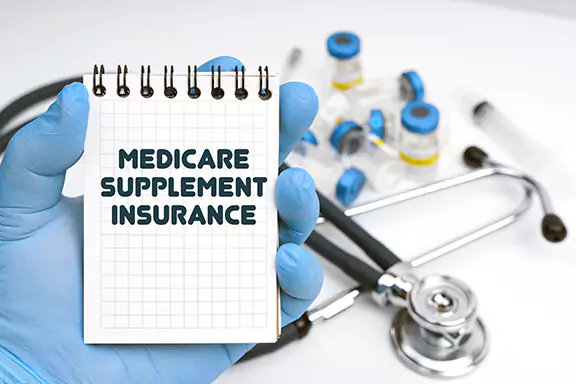What Does Standard Medicare Cover?
Dental and vision needs are important components of healthcare plans for seniors. Yet the coverage for these services provided by Medicare, the program set up by the Federal Government to bring affordable insurance to seniors and younger people with disability, is often inadequate.
If you or someone you are caring for are encountering this problem, you have come to the right place.
We will not only look into what dental and vision insurance for seniors on Medicare is covered under standard Medicare but also what additional insurance they may need. Most importantly, we will explore the extra benefits through Medicare Advantage plans.
As mentioned, the Federal Government set up Medicare to provide affordable healthcare coverage for people who are 65 or older and younger people with certain disabilities. The most basic component of the program is known as Original Medicare, which is divided into two parts: Part A, which covers hospital stays, and Part B, which covers doctor visits and other outpatient services.
While Original Medicare does look after many areas of a participant’s basic health care needs, it doesn’t include routine dental coverage and vision checkups.
Medigap Policies
This may come as a disappointment to many seniors: Medicare Supplement Plans, or Medigap policies, while providing many additional healthcare coverage on top of what Original Medicare offers, normally don’t cover dental or vision care. So while it does fill in the many “gaps” in Original Medicare coverage — such as copayments, deductibles, and coinsurance — Medigap considers dental and vision care as separate services from Medicare and hence doesn’t cover them.
So what can you do?

Getting Additional Senior Dental and Vision Plans
One way for seniors on Medicare and Medigap policies to get dental or vision benefits is to purchase additional health insurance. They can do that by enrolling in standalone dental benefits and vision insurance plans from private insurance providers.
Remember: we all have our own interpretation of what “best coverage” means. So when it comes to getting dental and vision insurance coverage, make sure you review all options available before picking the plans that best suit your healthcare needs.
Here are some key things you should consider when picking your dental insurance plan:
Areas of coverage: make sure your plan covers the dental services you need, such as cleanings, fillings, root canals, and additional preventive dental care services.
Out-of-pocket costs: your premiums, deductibles, and copayments will all affect the amount of your out-of-pocket costs.
Network of dental providers: if your preferred provider is not in the plan’s network, you may have to switch to another provider.
Limitations: before enrolling, review your plan carefully for limitations on certain major services, procedures, and long waiting periods.
Provider’s reputation: make sure you choose a provider with high customer satisfaction ratings.
Here are some key things you should consider when picking your vision care insurance plan:
Areas of coverage: make sure the plan covers the vision services you need. For example eye exams, glasses, or contact lenses.
Out of pocket cost: your premiums, deductibles, and copayments will all affect the amount of your out of pocket costs.
Network of eye doctors: if your preferred eye doctor or eyewear provider is not in the plan’s network, you may have to switch to another provider.
Limitations: before enrolling, review your plan carefully for limitations on certain diagnostic services, types of eyewear, and long waiting periods.
Provider’s Reputation: make sure you choose a provider with high customer satisfaction ratings.
Following this advice will increase your chance of finding a dental or vision insurance plan that fits your budget and healthcare needs.

What About Medicare Advantage Plans?
Another good option for seniors looking for more comprehensive coverage is to sign up for Medicare Advantage plans that include dental and vision benefits. Many of these plans offer services like routine dental checkups and eye exams, as well as coverage for teeth cleaning, X-rays and fillings, glasses and contact lenses.
There are many benefits to enrolling in a Medicare Advantage plan. For starters, having all their healthcare needs covered by a single policy instead of numerous stand-alone dental and vision plans, seniors can potentially save a significant amount of time and money. They can also eliminate the hassle of having to keep track of multiple premiums, deductibles, and copayments.
But while many Medicare Advantage plans offer excellent dental and vision benefits, seniors need to note the differences between these plans and make sure that they review the details and choose the one that best fits their healthcare needs and budget.
What is a Special Medicare Advantage Plan (DSNP)?
If you are a recipient of both Medicare and Medicaid, you may be eligible for Dual Eligible Special Needs Plans (DSNPs), which offer specialized healthcare services and additional benefits. These may include dental care, vision, hearing coverage, transportation to medical appointments, and gym memberships.
On top of that, DSNPs also have additional special enrollment periods throughout the year, which allow eligible individuals to enroll in the plan outside of the standard enrollment period. DSNPs can be a good option for you if your healthcare needs are more complex and require more specialized care.
That said, not all Medicare Advantage providers offer DSNP options, so make sure you check with them to determine your eligibility and the plan options available in your area.
Contact a Licensed Insurance Agent to Learn More About Your Options for Dental and Vision Insurance
If you or someone you know is on Medicare and needs dental and vision coverage, here is what you should do: Contact a licensed Medicare broker today to discuss your options. They will help you find the right Medicare Plans available in your state and assist you in the enrollment process.




